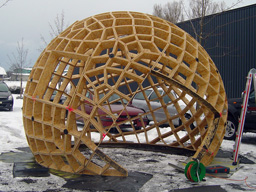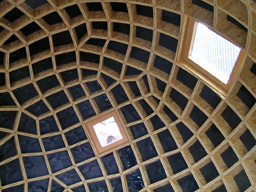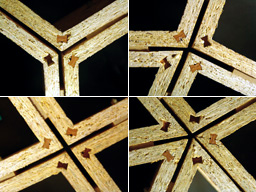|
designtoproduction • profile • team • awards and publications • how to find us | |||||

|


|
||||
|
CAAD Swissbau Pavilion Wooden pavilion with self-organised structure 2005 Awarded with the Holz21 Prize 2005 Organisation I-Catcher GmbH Basel Ruedi Tobler, Felix Knobel Geometry Consulting and Engineering caad.designtoproduction ETH Zürich Christoph Schindler, Fabian Scheurer, Markus Braach CNC-Production Bach Heiden AG Heiden (CH) Franz Roman Bach, Hansueli Dumelin Additional Information Growing Mesh Quicktime Movie (4.7 MB) << back |
The CAAD Swissbau Pavilion was designed and built to show the potential of the digital chain on the Swissbau 2005 fair in Basel. It has the form of a sphere with two metres radius and reaches a height of three metres. It is assembled from quadrilateral wooden frames, each consisting of four wooden boards standing perpendicular on the surface of the sphere. But while in a traditional coffered dome a regular structure dictates the placement of openings, here the frames are required to adapt their size and angles to the deliberately asymmetric placement of windows. To generate this adaptive geometry, an interactive software was programmed in Java that simulates the growth of a quadrilateral mesh on a sphere following simple rules: The edges try to align with the positions of the predefined openings and the floor level, while at the same time every mesh attempts to optimise its size and angles. The simulation of this process is running in real-time and can be influ¬enced directly by the user. Under certain circumstances the structure can locally alter its topology by inserting or deleting meshes until it reaches a stable state. The resulting geometry of nodes and edges is then exported to an XML file and used as the base for the rest of the digital chain. The subsequent steps are analogue to the first two examples: a script reads the XML file into the CAD-software Vectorworks and generates a 3D-model of the pavilion with the exact geometries of all 320 wooden frames and their 1280 parts. All parts are automatically numbered and a second script arranges them on the raw boards used for milling. The G-Code for controlling the CNC-router is exported automatically for every board and already includes information for drilling the holes and milling the unique part-id into the boards. |
||||
|
Revision r1.16 - 20 Aug 2006 - 11:55 - ChristophSchindler Parents: WebHome |
|